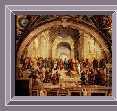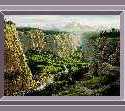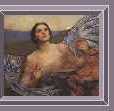and
The Christian Guide to Fantasy
Alternate History - Fantastic Fiction wherein the history of this world is tampered with, (i.e., Napoleon never lived), and its results explicated and theorised by means of a story.
Alternate Reality - A subgenre and hybrid of Urban Fantasy and Alternate History; this often fun and extraordinarly small genre not only alters this world's history, but also its dynamics. Since this sub-genre is small, it has not been swayed one way or another in terms of morals. However, with the advent of The Shadow of Albion it's leaning more towards secular paganism. (*Note*: It's not too late to reclaim it! Hint. Hint.)
Classification - The third division of artwork into what general rules will be applied. In literature, the classifications for prose are Fiction and Non-Fiction.
Cyberpunk - A subgenre of Science Fiction; this deals with the effect of the internet/virtual reality/cloning/etc. (i.e., plausible science fiction) within a Dark Science Fiction setting. Generally set in the near future, often with psychadellic effects, often dangerous morality. An example is the film The Matrix.
Dark Fantasy - A subgenre of Fantasy (also Dark Science Fiction); this genre is almost always overrun by those who are not merely secular pagans, but tend more towards Satanism. Vampirism, bondage, sado-masochism, gore, etc. are common elements.
Epic Fantasy - A subgenre of Fantasy; often cross-referenced with "High Fantasy." This sub-genre includes not only Tolkein and his Several Dwarves, but also those original classics, such as Beowulf, Sir Gawain and the Green Knight, and various other ancient epics.
Fairy Tales - A subgenre of Fantasy; these include the Grimms, Andersons, Arabian Nights, Aesops, etc. of the world. Almost always excellent in both literary and moral quality. A recent surge has been made by secular paganism to subvert the children's tales which are predominantly Catholic in theme, in order to sway children early on in the neo-paganistic mores. Again, a major battlefield!
Fantastic Fiction - Any fiction that takes place within the confines of another world, or in this world but with significant aberration within its history, future, physics or dynamics.
Fantasy - The purest form of Fantastic Fiction: the majority of the action does not take place within this world.
Fiction - Prose based on something that did not happen or has not happened, implementing plot and character to exemplify thought.
Form - The first category when dividing the arts. Some forms are artwork, literature, music, drama, et cetera.
Genre - A style or type, in this case relating specifically to literature; e.g., science-fiction, mystery, romance, etc.
Hard Science Fiction - A subgenre of Science Fiction; almost strictly "nuts'n'bolts" literature, wherein the author pauses the plot to describe exactly how something works.
High Fantasy - A subgenre of Fantasy; occasionally known as "Epic Fantasy," this generally deals with kings, quests, and a fair amount of Tolkeinesque literature. Magic is often a mysterious force, and there's often an empire at stake. For "Low Fantasy" see "Sword and Sorcery."
Humorous Fantasy - A subgenre of Fantasy; unsurprisingly, funny.
Humorous Science Fiction - A subgenre of Science Fiction; unsurprisingly, funny.
Literature - Books, magazines, articles, plays, short stories, poems-anything that utilizes the written word.
Militaristic Fantasy - A subgenre of Fantasy; a little-used subgenre, created mainly to answer the original Science Fiction subgenre. The emphasis is on militaristic tactics in a completely different world.
Militaristic Science Fiction - A subgenre of Science Fiction; this deals primarily with the question of war and science's effect upon it. For an example, see Ender's Game by Orson Scott Card.
Non-Fiction - Prose based on something that has happened or is happening.
Political Fantasy - A subgenre of Fantasy; differentiated from Political Science Fiction by its being in a completely different world (see above definitions of "Fantasy" vs. "Science Fiction"). The emphasis or study of this world, though, centers not merely on the social (i.e., human) interactions, but on the form of politics as it affects society.
Politics - The distribution of power within a society; the forces behind a society-human or divine.
Prose - The organization of the written word into paragraph form.
Realistic Fantasy - A subgenre of Fantasy; this subgenre is generally associated almost exclusively with Latin American Fantastic Fiction. Its hallmark is the use of the paranormal as if it were common in today's society. Differentiated from Urban Fantasy by its quality of literature (much better).
Realistic Fiction - Any fiction that takes place within the confines of this world with little to no aberration in its present history, physics or dynamics.
Science Fantasy - A subgenre and hybrid of Fantasy and Science Fiction; this, too, is a small sub-genre, fairly new and not fully developed. Its hallmarks are adding in elements of advanced technology into Fantasy works, as well as treating the fantastic with scientific explanation.
Science Fiction - Another form of Fantastic Fiction: the majority of the action takes place in this world and universe, usually speculating on the future, and involving technical advancements.
Speculative Fiction - Another name for the supergenre of Fantastic Fiction and/or the genre of Science Fiction.
Steampunk - A subgenre of Alternate History; this generally deals with advanced technology in the altered past.
Style - The category that subdivides forms into how that art is presented. In literature, the styles may be prose, poetry, plays and so on. In artwork, the styles may be painting, sculpture, et cetera.
Subgenre - A subdivision of a genre; e.g., high fantasy, dark fantasy, cyberpunk, space opera.
Supergenre - The larger class of genres; specifically in the Fiction Class: Realistic and Fantastic Fiction
Sword and Sorcery - A subgenre of Fantasy; arguably also known as "Low Fantasy," this stories often deal with hack-and-slash heroics, obligatory questing, and minimal worldbuilding. The emphasis is on the action rather than the thought. Common characters are witches and mercenaries. At the moment, the most fertile breeding ground for secular paganism, and the most common and preferred genre. (*Note*: The major publisher, at the moment of S&S, is DAW books).
Traditional Fantasy - A subgenre of Fantasy; this style of literature can be seen in a variety of ways: stay-at-home High Fantasy, adult Fairy Tales, world-built Sword and Sorcery, and anything else that's middle of the road fantasy.
Urban Fantasy - A subgenre of Fantasy; the action takes place in this world at this time, with no change in Earth's history, but rather in its dynamics (i.e., physics: usually magic is possible). Another area most often under the influence of secular paganism.
World - What is described in Genesis 1-2, or, in literature, any variation on what God has done (with realization that all we "create" is due solely to what God has truly Created). A world includes all the history, physics, politics, society, universe and other dynamics that are found in this world/universe.
Worldbuilding - The hallmark of Fantasy. Worldbuilding is the "creation" of a purely fictional world for purposes of a story to be played out in it. Geography, weather, history, society, religion, flora, fauna, etc. all must be dealth with and inserted in their place within the context of the story. For examples of excellent worldbuilders, see Tolkein, as well as the Worldbuilders page.
(c) 3 May, 1999


 Back to Introduction to Political Fantasy
Back to Introduction to Political Fantasy Back to Definition of Political Fantasy
Back to Definition of Political Fantasy Back to Development of Political Fantasy
Back to Development of Political Fantasy Back to Defense of Political Fantasy
Back to Defense of Political Fantasy



Updated 6 October, 2000
All Rights Held by the Author.
No part of this document may be used or copied without express permission of the author.